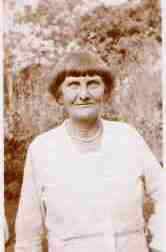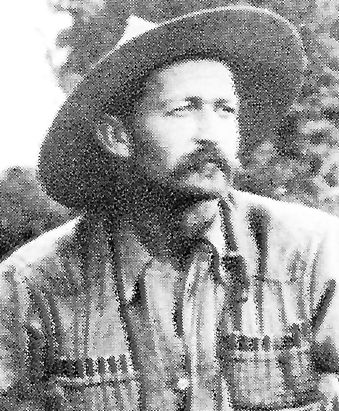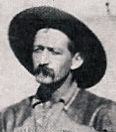Back to search results
Name: JUDD, William Charles Ernest 'Billy'



Birth Date: 1872 Portsea Island, Hants.
Death Date: 21.12.1927 killed by elephant near Mtito Andei
Nationality: South African
First Date: 1902 trekked up from SA
Last Date: 1927
Profession: Experienced big-game hunter, 1908 bought Fort Smith
Area: 1st camped at Naivasha, Built large stone house at Kabete, Makindu, 1902 Naivasha
Married: In Loughton, Essex 23 Nov 1897 Eleanor Jane Miles Maslen Gostling b. 24.1.1875 Rowde, Wilts., d. 1966 Nakuru. She was born Maslen but had been adoped by John and Lucy Gostling in 1891. Lucy was her aunt. She arrived EA 1906
Children: Lucy Eleanor (1899); Richard Norman (1904); William John (14.6.1900 Gravesend); Jack, Robert, Norah Mary (17.3.1899 Gravesend, married A.D. Davis of Nakuru)
Book Reference: Gillett, SE, Jordan, Ker, Nature, Unger, Kill, Nimrod, Wanderings, Trail, Stoneham Wanderings, Roosevelt, White Man, KAD, Red 25, Hut, North, Playne, Drumkey, Red 22, Into Africa, Land, Elephant, EAHB 1906, Barnes, Medals, EAHB 1907, Chandler, Mills Norfo
General Information:
SE - W.C. Judd - Jan 1908
Ker - trampled to death by an elephant.
Nature - A colourful character - a bull elephant charged him, seized him with its trunk, swept him to and fro along the ground, breaking most of the bones in his body, and smashed him against a tree. There was a reason for Judd's destruction. He was getting on in years, had been following the bull all day, had been strongly advised by his wise old tracker to give up the pursuit, had persisted and walked into the thick scrub in which the elephant waited to turn the tables on him.
Unger - 1909 - Roosevelt Trip - On McMillan's ranch J.H. Judd [sic] a professional hunter took part.
Wanderings - one of the most charming of men and best of hunters, ........ Judd's trading store on the river ........ so excellent a camp manager as Judd. ..…..
Trail - 1912 - the celebrated big game hunter, who had shot as much game as, or more than, any other white man........ He, poor fellow, recently lost his life whilst shooting an elephant in company with his son. He had had many exciting experiences. During the Matabele War he was fired at by a native at close range from behind, with an old flint-lock 'gaspipe' gun loaded with telegraph wire, which charge lodged in his left arm. He turned round though badly wounded and shot and killed his assailant. Being a big game hunter and always looking for trophies, he cut off the man's ears and put them in spirit as a souvenir! His left arm was still full of wire but he could shoot with unerring aim from either shoulder. ........ his farm near Kikuyu ....... on the Amala River, Judd had a store and traded with the natives .….
Stoneham Wanderings - 1927 - Death of William Judd - he had killed over 150 elephants; he was one of the foremost hunters of Africa. He and his son came upon the spoor of a solitary bull elephant in the evening, just as they were about to camp. They followed the spoor, but when, after several miles of trekking, they had not come up with the beast, Judd decided to abandon the hunt for that night. At the moment he announced this decision to his son they heard the elephant moving in the bush close at hand. Now, who shall say that the hunter's luck did not forsake Bill Judd at that moment? He stole through a screen of bush into a little clearing and there was the quarry, a big elephant with big tusks. Judd fired both barrels; the elephant charged. The hunter stepped aside to reload and allow his son to take a turn, but the son could not stop the beast. The elephant pushed the younger man aside so that he fell headlong, dashed upon the father and, seizing him with its trunk, pulled him onto its tusk. Having killed him by this horrible means it took his body by the heels and threshed it against the trees. Young Judd was shooting at the beast while it did this, and after a time it succumbed to its wounds and fell dead.
White Man - WW1 - Intelligence instructions to Lord Delamere - ' .......... Judd, Postma and Hitching will come down later to work in conjunction with you and under your orders .…. '
Playne - Having been shooting big game on the East Coast of Africa and Rhodesia for over 20 years, Mr W.C. Judd may well claim to be one of the pioneer hunters of these parts. Mr Judd, who came to BEA in 1902, from Rhodesia, having had previous experience in USA and Australia, is out on safari for some 109 months of the year, and is always open to engagement by cable. Every arrangement for a shooting trip can be made by the time a client arrives in the country. He has personally conducted Sir Edmund Lechmere, Baron Goldschmidt, Baron Rothschild, and many other well-known sportsmen, and over 150 elephants have been shot by parties under Mr Judd's control. His farm, Fort Smith, of 340 acres, is historical, being the old original fort of some 14 years ago. .......... Some fine old eucalyptus and wattle trees are to be seen on the property, and also lime, lemon, and fig trees. These fruits do well, ......... The dwelling house is of brick (burnt on the farm) with iron roof, and the bomas, 60 by 60, are of stone. Mr Judd employs from 12 to 40 natives, and runs the farm himself. He is well known as a breeder of Airedale dogs from pedigree stock. Considerable interest attaches to 8 old graves on the property, two of which have gravestones with the following inscriptions:- 1. In memory of W.A. Harrison, Died 1898, killed by a lioness. 2. In Memory of Capt. A.J. Haslan, Army Veterinary Dept., Killed by Wakikuyu, 1898.
Into Africa - evaluation of possible white hunters - Judd. Good shot, keen hunter, good knowledge of game, and game districts. ….. [W.S.] Rainsford hectored Roosevelt on the subject: he needed somebody to back him up in dangerous situations, and that person should not be Judd because Rainsford had seen Judd let somebody down and get a gunbearer badly injured. (Later in a book he would mean Judd when he wrote about the white hunter 'who afterward proved to be a very nervous shot himself [and] failed his man badly, [missing his first shot on a lion and then shooting the lion in the wrong spot]'. Will Judd had a 'trading store' on the Mara River in 1913
Into Africa - After Cuninghame, probably the best-known of the early white hunters was Judd. He was generally respected, with the signal (and vocal) exception of Rainsford. 'Probably the most experienced and capable hunter of African big game now living', one visitor said, and Jackson called him 'celebrated … a good hunter ….. Dressed immaculately in hunting kit with shiny brown boots and highly polished gaiters, a maradadi in fact'. Judd in 1913 was keeping a 'trading store' on the Mara River, presumably while continuing as a white hunter in the season. He stayed in East Africa after the war and was killed by an elephant in the late 1920s.
Land 1909 - W.C. Judd - Buildings, 3.01 acres - Parklands - 20/2/05 - Leasehold for 25 years from 1/1/09 - Registered 2/8/09
Elephant - Will Judd, who is well remembered by the older generation of Kenya hunters, was an extraordinarily fine hunter, who was killed by an elephant at Kibwezi.
Nairobi Forest Road cemetery - William Charles Judd, British, age 56, died 21/12/27
Medals - East African Intelligence Department - Agent
North - At Mombasa meeting wife when she arr. Mombasa from Genoa with 2 children, Lucy E. (1899) & John (1900), 30-12-1905
Chandler - A highly respected outdoorsman who first came to East Africa in 1899, Judd made his name as a hunter while running a coffee farm at Fort Smith and a ranch at Lake Naivasha. His hunting exploits were legendary. Selous told a story of how he and Judd were riding mules through rough terrain on the Mau Plateau when a lioness sprang from cover right at Judd. Judd's mule bucked and threw him. As he fell he got a shot off with his rifle. Scrambling immediately into a crouch, Judd looked for the lioness to complete her charge, but she lay dead on the ground. His snapshot, fired as he was being thrown, had hit the lioness in the right eye and penetrated the brain. A veteran of the Boer War, Judd was one of the first Kenya hunters to make a regular business of guiding amateur hunters. Among his clients were William Northrup McMillan, Sir Edmund Lechmere, Baron Rothschild, Congressman Tinkham, and the Roosevelts. Judd also hunted in the Lado Enclave. He was a literate man and wrote occasional articles for the British sporting periodical 'The Field'. Sadly, like a retiring cop in an action movie, Judd was killed on what was to be his last safari. On 20 December 1927, while hunting elephant with his son Jack, Bill Judd was tusked and trampled to death by a bull elephant that was not stopped by four shots from his own .577 Westley-Richards double. Only after his father was dead did Jack Judd manage to drop the bull with a brain shot from his .350 Rigby Mauser.
Kill - a famous professional guide and elephant hunter and a good friend of Foran's.
Hut - Auctioneer
Mills Norfolk - Billy Judd was another regular frequenter of the Norfolk Hotel who had worked in Australia and America and seen action in South Africa during the Boer War before he arrived in Kenya in 1902. He had been one of the several local hunters attached to the Roosevelt safari in 1909. His end was both tragic and dramatic. Hunting elephant with his son near Mtito Andei, the boy tripped and fell while loading and shot his father instead. The elephant, which should have been their trophy, grabbed Billy Judd by its trunk, threw him down and stamped on his face. He died instantly.
Gazette - 10/1/1928 - Probate and Administration - William Charles Ernest Judd late of Kabete who died at Mtitoande on 20 December 1927. Applied for by John William Judd of Nairobi
Gazette - 11/5/1927 - Application for Wine Merchant's & Grocer's Liquor Licence - W C Judd - Kabete Stores, Kabete Lodge, Farm 1127 Kabete
Ancestry Family tree In 1928 wife travelled to London for an op. While in England she read of her husband's death on the front page of the Daily Express
Back to search results



